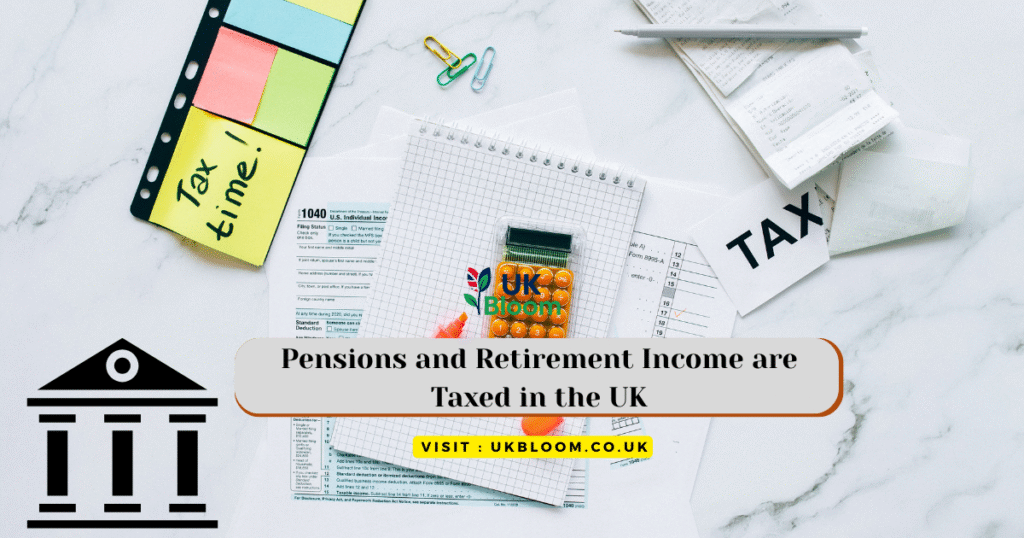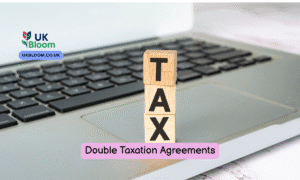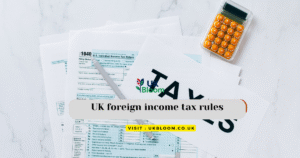Pensions and Retirement Income are Taxed in the UK, Retirement in the UK is supported through a combination of state pension, workplace pensions, and personal pensions. All retirement income may be subject to taxation depending on the amount received annually. As life expectancy rises, understanding how to optimize pension income and minimise tax burdens becomes crucial for every UK resident and expat retiree.
Table of Contents
Pensions and Retirement Income are Taxed in the UK
UK State Pension: What You Need to Know
The UK State Pension is a regular payment from the government that you can claim once you reach State Pension age, which is currently 66 (rising to 67 by 2028).
Eligibility
You need at least 10 qualifying years of National Insurance contributions to receive any State Pension, and 35 years to qualify for the full amount.
Full New State Pension (2025–2026)
- Weekly amount: £221.20
- Annual total: £11,502.40
(Subject to change annually. Source: GOV.UK)
Internal Link:
Check our full guide: UK State Pension Explained
Types of Private Pensions in the UK
1. Workplace Pensions
These are arranged by employers and include:
- Defined Contribution Pensions
- Defined Benefit (Final Salary) Schemes
2. Personal Pensions
Private pensions you set up yourself with a pension provider:
- Self-Invested Personal Pensions (SIPPs)
- Stakeholder Pensions
Contributions to these pensions benefit from tax relief, making them an essential part of long-term planning.
How Retirement Income is Taxed in the UK
Pensions are treated as taxable income by HMRC. You start paying Income Tax when your total income exceeds your Personal Allowance.
Taxable Income Includes:
- State Pension
- Occupational Pension
- Personal Pension
- Rental Income
- Annuities
- Investment Income
Tax-Free Pension Lump Sum
You can usually take up to 25% of your pension pot tax-free. This applies to both defined contribution and defined benefit pensions.
Example:
If your pension pot is worth £200,000:
- Tax-free lump sum: £50,000
- Taxable pension income: £150,000 (spread over retirement)
Income Tax Bands for Pensioners (2025 Rates)
The Personal Allowance in 2025–26 is expected to remain at £12,570. If your total income exceeds this, you will pay tax as per the following bands:
| Income Range (£) | Tax Rate |
|---|---|
| Up to £12,570 | 0% (Personal Allowance) |
| £12,571–£50,270 | 20% (Basic Rate) |
| £50,271–£125,140 | 40% (Higher Rate) |
| Over £125,140 | 45% (Additional Rate) |
Note: The State Pension is taxable, but tax is not deducted at source. HMRC will adjust the tax code for your private pension to collect tax on your State Pension.
National Insurance After Retirement
You do not pay National Insurance (NI) on pension income after reaching State Pension age. However, if you continue to work past retirement age, NI may still be payable on earnings from employment or self-employment.
Taxation for Expats Retiring in the UK
If you’re an expat or foreign national retiring in the UK, the tax treatment of your pension depends on:
- UK residency status
- Double taxation agreements (DTAs)
- Source of pension income
Key Scenarios:
- UK-Resident with Foreign Pension: Taxed in the UK; DTA may prevent double taxation.
- UK Pension Drawn Abroad: UK tax may still apply depending on your residency.
See HMRC guidance: Tax on foreign income
Internal link: DWP Updates
Inheritance Tax and Pensions
Pension pots can be passed on tax-free if you die before age 75. After age 75, the recipient pays Income Tax on withdrawals from inherited pension funds.
Exemptions:
- Defined benefit pensions typically cannot be inherited
- SIPPs and DC pensions are more flexible for inheritance planning
Inheritance Tax (IHT) doesn’t usually apply to pension savings unless they’re transferred within two years of death.
Pension Credit and Other Retirement Benefits
1. Pension Credit
A means-tested benefit for low-income pensioners. In 2025:
- Single person: £218.15/week
- Couple: £332.95/week
Source: GOV.UK Pension Credit
2. Winter Fuel Payment
£250–£600 to help with heating bills.
3. Free Prescriptions & Travel
Available for those over State Pension age.
Planning Ahead: Tax-Efficient Retirement Strategies
Maximise ISA Allowance
ISAs offer tax-free income — use your £20,000 yearly limit.
Delay Drawing Pensions
Delaying withdrawals can keep you in a lower tax bracket and allow your pot to grow.
Consider Phased Retirement
Draw income gradually to manage tax liability more efficiently.
Use Spouse’s Allowance
Split pension withdrawals to use both partners’ Personal Allowances.
Hire a Pension Adviser
A regulated financial adviser can help plan tax-efficient withdrawals and optimise for inheritance.
Useful Resources & Tools
- Check Your State Pension Forecast
- Pension Wise Free Guidance
- UKBloom Income Tax Calculator
- Best pension plan
- taxable and non taxable income in the UK
Conclusion
Navigating the UK’s pension and tax system requires proactive planning. Whether you’re a lifelong UK resident or a new retiree settling here, understanding how pension income is taxed and what benefits you’re entitled to can help you retire with more peace of mind.
At UK Bloom, we provide trusted guidance and tools to help you make smarter choices for your retirement journey.
Disclaimer
This article is for informational purposes only. Always consult the UK Home Office, HMRC, or a licensed financial adviser for personalized advice.
© 2025 UKBloom.co.uk. This article is free to use for personal or educational purposes. Reproduction without attribution may result in copyright infringement. Please credit UKBloom.co.uk when using this content.






